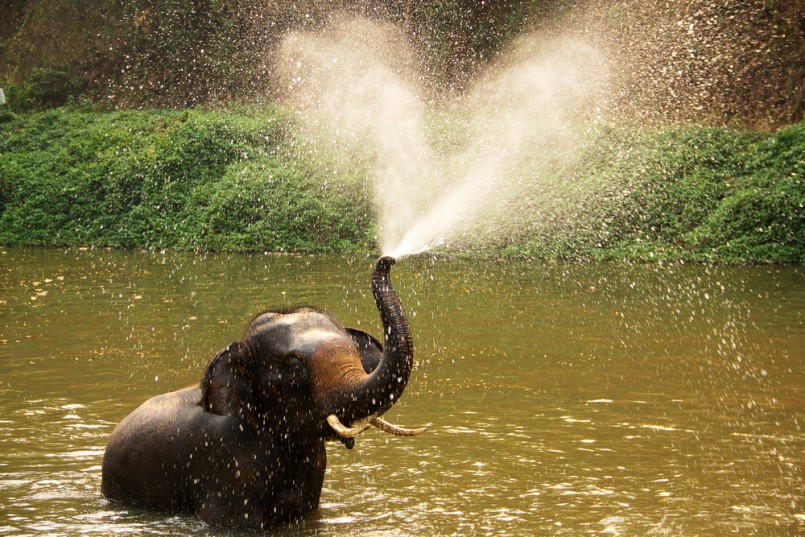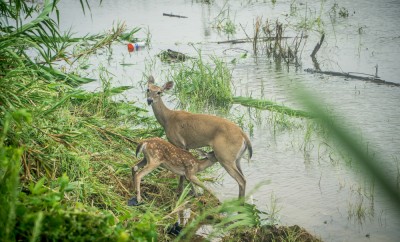Environment
5 Endangered Species Supported Through Ecotourism

Image: Shutterstock/prajit48
5 Endangered Species Supported Through Ecotourism
Among travelers and environmental enthusiasts ecotourism has become the new buzzword, which has caused some confusion in what it actually means. It’s not paying to ride an endangered elephant or feeding a dolphin. Ecotourism associations exist to protect, breed, rehabilitate and re-establish vulnerable species into the wild. Their work is often funded through tourism in which individuals visit these centers to learn about the animals and see their work in action. If you want to see endangered species and simultaneously contribute to their livelihood there are a variety of locations and species you can visit around the world.
Loggerhead Turtles, Boa Vista, Cape Verde
In the early 2000s, unsuspecting tourists often encountered the remains of endangered Loggerhead Turtles on Boa Vista’s white sand beaches. Locals captured and sold the endangered turtles for their meat. Loggerhead turtles play an important part in their local ecosystems as their shells are home to more than 100 types of small plants and animals. Naturalia, a Boa Vista company, hosts turtle watching tours to raise awareness that turtles are more valuable when kept alive. Today, turtle watching is among the most profitable ventures on the island of Cape Verde.
Asian Elephants, Chiang Mai, Thailand
Numerous species of Asian elephants are endangered. While African Elephants number 500,000, The Elephant Nature Park estimates less than 30,000 Asian Elephants are left on the planet. Due to illegal capture of wild elephants and industrial development of their habitats, elephants struggle to find food and a place to live. The Elephant Nature Park in Thailand rescues elephants, dogs, cats, buffalos and numerous other animals. Many of the elephants are also rescued from riding camps, and as a result, the park does not offer elephant rides. Visitors have the opportunity to volunteer alongside mahouts (elephant trainers) helping with feeding and bathing the elephants and other animals in the park.
Orangutans, Sabah, Malaysia
Orangutans, the species possessing most similarities to humans, struggle to survive in the wild. Illegal capture by poachers and deforestation remain their greatest threats. The Sepilok Orang Utan Rehabilitation center rescues and raises orphaned baby orangutans to prepare them for life in the wild. Visitors to the reserve are free to hike several trails on the grounds, but only after participating in an education seminar. Once inside, visitors can watch the pranks of baby orangutans in the nursery or an older orangutan showing a baby how to climb a tree.
Black Rhinos, Damaraland, Namibia
Early European settlers to Africa quickly and thoughtlessly killed rhinos, likening them to large rodents and undesirable vermin. Midway through the 1960s, conservationists realized that black rhinos, one of the oldest mammals known to man, was headed for extinction. Though the black rhino population remains critically endangered, growth in the population is promising thanks to organizations like Desert Rhino Camp, part of the Save the Rhino Trust (SRT). DRC offers guided rhino sightseeing tours and resort-style accommodation near rhino refuges in Namibia.
Fin Whale, Nantucket, Massachusetts
In the early 20th century, an estimated 750,000 whales were killed according to the World Wildlife Foundation. Fin whales, native to the northeastern United States, are listed as endangered with an estimated 50,000-70,000 whales in existence. Shearwater excursions of Nantucket, Massachusetts partners with the National Oceanic and Atmospheric Administration (NOAA) and takes care to meet recommended whale watching guidelines. They offer cruises with a naturalist aboard to answer questions.
Most genuine ecotourism providers allow limited physical interaction with animals, if at all. For certain species, the interactions can actually produce more harm than good if they are not accustomed to interacting with humans. Consider ecotourism an opportunity to enjoy a new culture, beautiful surroundings and learn about how you can make the world a better place for all species.





0 comments